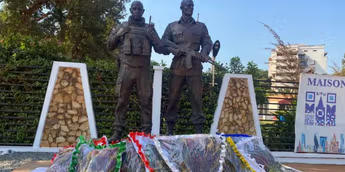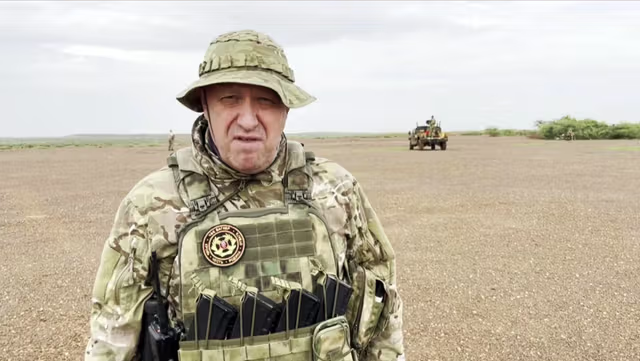Monument Honoring Late Russian Mercenary Leader, Yevgeny Prigozhin Unveiled in the Central African Republic

A monument commemorating Yevgeny Prigozhin and Dmitry Utkin, the late leaders of Russia’s Wagner Group, has been unveiled in Bangui, the capital of the Central African Republic (CAR). The statue, a symbolic gesture reflecting the deep ties between CAR and the Wagner Group, was revealed during a ceremony attended by Defense Minister Rameau Claude Bireau and senior military officials.
The monument portrays Prigozhin in bulletproof gear, holding a walkie-talkie, while his associate, Dmitry Utkin, is depicted with an AK-47 rifle. Both men were pivotal figures in Wagner’s operations but met a tragic end in a plane crash last year following a controversial mutiny against Russia’s military leadership.

The Wagner Group has been active in the Central African Republic since 2018, following an invitation from President Faustin-Archange Touadéra. The private military company was brought in to assist CAR’s government in combating rebel factions and restoring order to a nation grappling with prolonged instability.
President Touadéra has openly defended the presence of Wagner forces in his country. Speaking to the BBC, he noted, “It was said that 80% of the territory was occupied by armed groups. Today, thanks to this cooperation, these figures are completely reversed.”
The unveiling of the monument has been described by CAR’s national police as a reflection of the bilateral relationship between CAR and Russia. Wagner’s involvement in CAR has not only included military assistance but also extended to securing key resources and advising on governance, cementing its influence within the country.

The tribute to Prigozhin and Utkin comes after their dramatic demise last year. About two months after Wagner staged a brief mutiny against the Russian military, the private plane carrying Prigozhin and Utkin reportedly crashed under suspicious circumstances.
Prigozhin had led Wagner mercenaries from Ukraine toward Moscow in an act widely condemned as treason by Russian President Vladimir Putin. Although the rebellion ended without significant bloodshed, it severely strained relations between Prigozhin and the Kremlin.
Russian authorities confirmed that Prigozhin and Utkin were among the 10 individuals killed in the crash. Genetic testing matched their identities with the names on the flight manifest, ending widespread speculation about Prigozhin’s fate.
In his initial comments on the crash, President Putin suggested sabotage, stating that fragments of hand grenades were found among the remains, hinting that the explosion occurred inside the aircraft. This fueled speculation, particularly on Wagner-linked social media accounts, that Russian air defenses may have downed the plane.
The monument in Bangui serves as a stark reminder of the Wagner Group’s dual legacy: one of formidable military capability and controversial geopolitics. For the Central African Republic, it also underscores the country’s reliance on Russian support in its ongoing fight against armed insurgencies.
While the monument has drawn attention for its symbolism, it also highlights the growing complexities of Wagner’s role in Africa, even as its leadership undergoes seismic shifts following the deaths of Prigozhin and Utkin. For CAR, the statue not only honors past alliances but also signals the enduring presence of Russian influence in the region.




